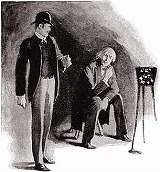I walked down the narrow passage between the double row of sleepers, holding my breath to keep out the vile, stupefying fumes of the drug, and looking about for the manager. As I passed the tall man who sat by the brazier I felt a sudden pluck at my skirt, and a low voice whispered, “Walk past me, and then look back at me.” The words fell quite distinctly upon my ear. I glanced down. They could only have come from the old man at my side, and yet he sat now as absorbed as ever, very thin, very wrinkled, bent with age, an opium pipe dangling down from between his knees, as though it had dropped in sheer lassitude from his fingers. I took two steps forward and looked back. It took all my self-control to prevent me from breaking out into a cry of astonishment. He had turned his back so that none could see him but I. His form had filled out, his wrinkles were gone, the dull eyes had regained their fire, and there, sitting by the fire and grinning at my surprise, was none other than Sherlock Holmes. He made a slight motion to me to approach him, and instantly, as he turned his face half round to the company once more, subsided into a doddering, loose-lipped senility.

“Holmes!” I whispered, “what on earth are you doing in this den?”
“As low as you can,” he answered; “I have excellent ears. If you would have the great kindness to get rid of that sottish friend of yours I should be exceedingly glad to have a little talk with you.”
“I have a cab outside.”
“Then pray send him home in it. You may safely trust him, for he appears to be too limp to get into any mischief. I should recommend you also to send a note by the cabman to your wife to say that you have thrown in your lot with me. If you will wait outside, I shall be with you in five minutes.”
It was difficult to refuse any of Sherlock Holmes’s requests, for they were always so exceedingly definite, and put forward with such a quiet air of mastery. I felt, however, that when Whitney was once confined in the cab my mission was practically accomplished; and for the rest, I could not wish anything better than to be associated with my friend in one of those singular adventures which were the normal condition of his existence. In a few minutes I had written my note, paid Whitney’s bill, led him out to the cab, and seen him driven through the darkness. In a very short time a decrepit figure had emerged from the opium den, and I was walking down the street with Sherlock Holmes. For two streets he shuffled along with a bent back and an uncertain foot. Then, glancing quickly round, he straightened himself out and burst into a hearty fit of laughter.
“I suppose, Watson,” said he, “that you imagine that I have added opium-smoking to cocaine injections, and all the other little weaknesses on which you have favoured me with your medical views.”
“I was certainly surprised to find you there.”
“But not more so than I to find you.”
“I came to find a friend.”
“And I to find an enemy.”
“An enemy?”
“Yes; one of my natural enemies, or, shall I say, my natural prey. Briefly, Watson, I am in the midst of a very remarkable inquiry, and I have hoped to find a clue in the incoherent ramblings of these sots, as I have done before now. Had I been recognized in that den my life would not have been worth an hour’s purchase; for I have used it before now for my own purposes, and the rascally lascar who runs it has sworn to have vengeance upon me. There is a trap-door at the back of that building, near the corner of Paul’s Wharf, which could tell some strange tales of what has passed through it upon the moonless nights.”
“What! You do not mean bodies?”